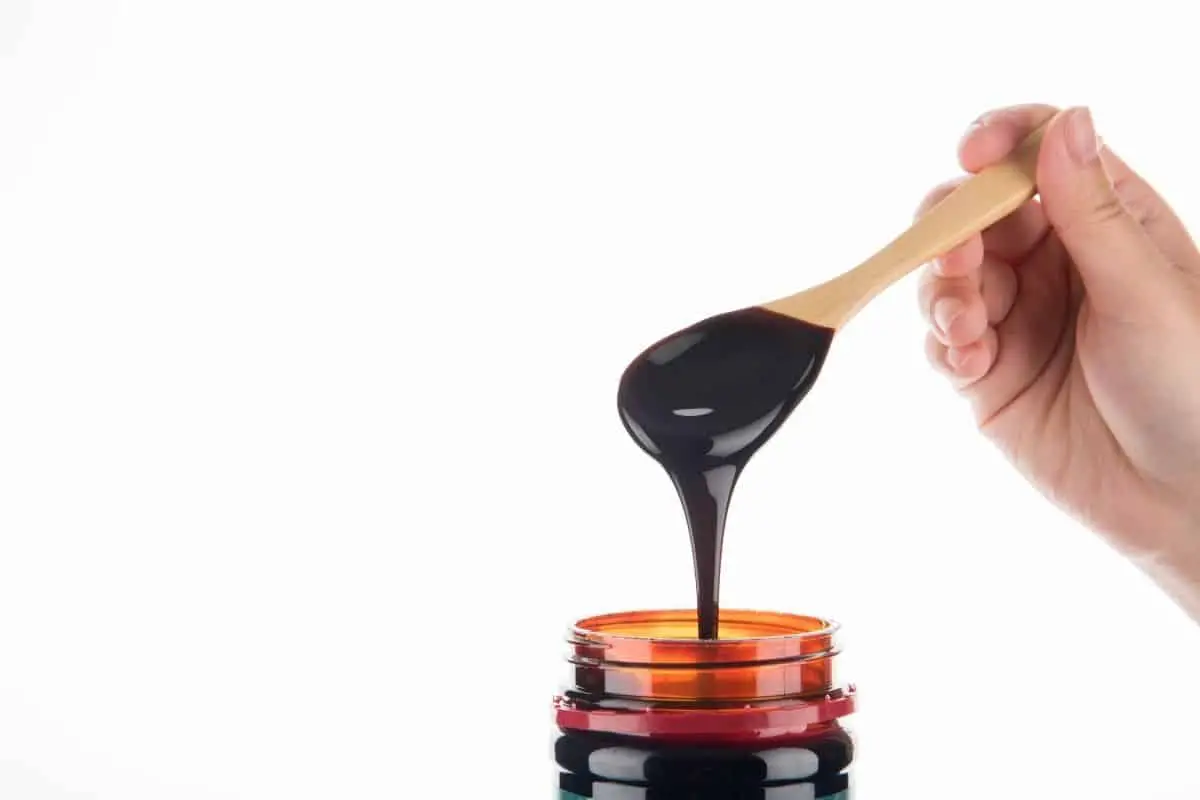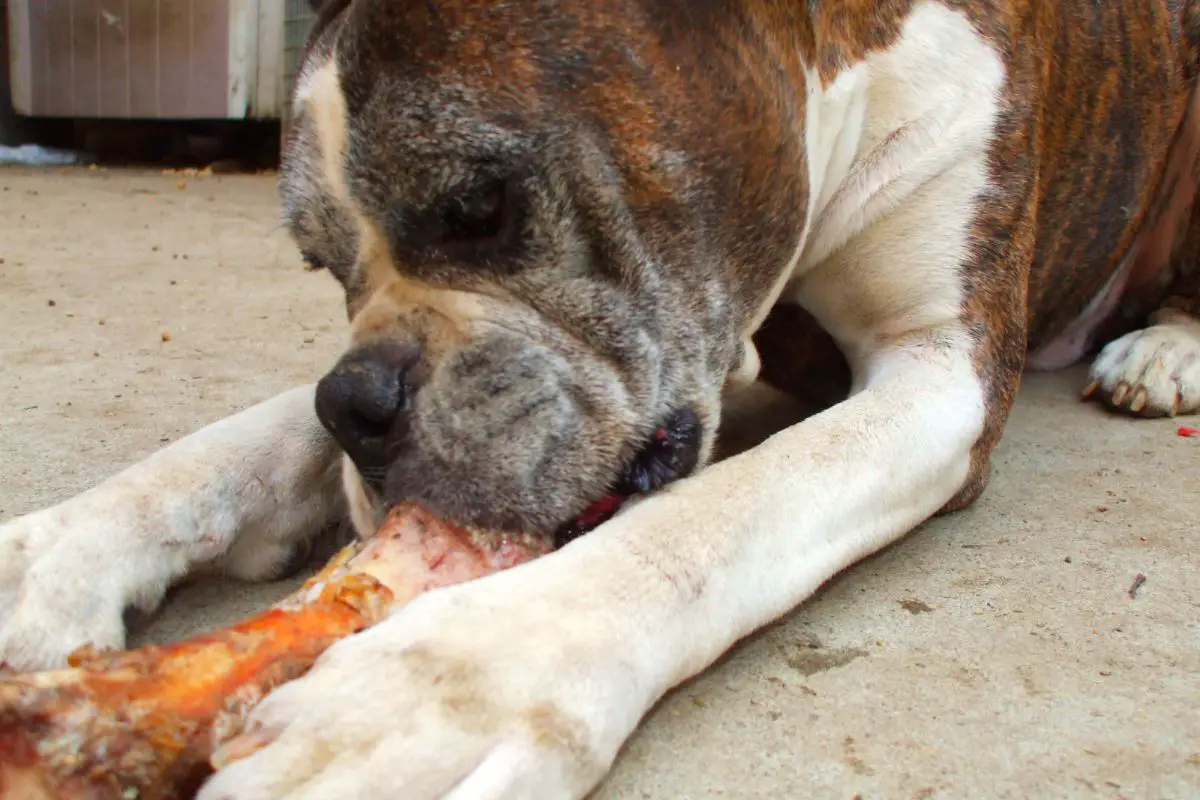This post contains affiliate links.
Most people use molasses as a natural sweetener substitute for sugar and artificial sweeteners in preparing healthy treats for human consumption. However, as much as it’s safe for humans, is it okay for dogs to eat it? More importantly, should they eat it?
Dogs can eat molasses, but only in small amounts. However, be sure to check that it doesn’t contain xylitol and other artificial sweeteners that are toxic to dogs. In fact, chemical-free molasses can be a healthy supplement for dogs when fed in moderation.
In this article, I’ll discuss whether dogs should eat molasses, the health benefits of natural molasses, as well as how you can feed this natural sweetener to your pup. Keep reading!
Table of Contents
Are Molasses Safe for Dogs?
Molasses is safe for consumption by canines but in small quantities.
If you want a healthy supplement for your pup, blackstrap is the best type of molasses to settle for, because it has a low sugar content and contains loads of vitamins, minerals, and other nutrients essential for your dog’s general health.
Since molasses is a by-product of sugar, it still has the potential to overload your dog’s pancreas and potentially cause pancreatitis. It can also cause obesity, tooth decay, and inflammation in your dog which would be responsible for arthritis or other issues.
However, before giving your pup this natural sweetener, always read through the ingredients label to ensure that it doesn’t contain traces of artificial sweeteners or other toxic additives that may harm your dog.
What Is Molasses?
Let’s understand what this sweetener is. Simply put, molasses is a thick, dark syrup that’s a by-product of the sugar-making process. Many people use it to sweeten coffee, cakes, cookies, and barbecue sauces.
During the sugar-making process, sugarcane or sugar beets are crushed to produce juice, which is then boiled to form sugar crystals. The syrup left over after the sugar crystals are extracted is known as molasses.
Generally, the sugar juice is subjected to different boiling cycles and crystallization to produce as much sugar as possible, with each cycle yielding a different type of molasses. Thus, with each cycle, the leftover molasses syrup contains a reduced sugar content.
Types of Molasses
There are different types of natural molasses that vary in color, thickness, taste, and nutritional composition based on the amount of sugar extracted.
The most common types of molasses are:
- Light molasses: This type is a by-product of the first boiling cycle. It’s light in color, has the highest sugar content, and is the least viscous.
- Medium or dark molasses: This type is extracted from the second boiling cycle, and is a bit more sticky than light molasses with lower sugar content.
- Blackstrap molasses: This is the final by-product (extracted from the third boiling stage) of the sugar-making process. It’s very sticky and dark in color and contains loads of vitamins and minerals. Its low sugar content gives it an almost bitter taste, which is perfect for making sauces to barbecue meat with. But be sure not to give your dog too much of this meat, as it could make him sick.
- Sulfured molasses: You may also come across some types of molasses labeled ‘sulfured’ molasses, which means the molasses have been treated with sulfur dioxide that acts as a preservative preventing it from going bad. In most cases, its syrup is derived from young sugarcane that’s treated with this chemical. Unfortunately, the sulfur dioxide bleaches the sugary tastes and leaves a chemical-like aftertaste.
- Unsulfured molasses: It contains no chemical treatment and is often extracted from mature, naturally ripened sugarcane.
Why Should Dogs Eat Molasses in Moderation?
Molasses is a by-product of sugar extraction, which isn’t a dog-friendly ingredient, so excess consumption of molasses can cause tooth decay, stomach upsets, obesity, and diabetes in dogs.
Additionally, some brands of molasses contain artificial sweeteners that can be toxic to dogs if consumed in high quantities. So, like all sugar products, molasses is only safe if consumed in small amounts.
Therefore, as a cautious dog parent, you should limit your pup’s molasses intake for the sake of his well-being.
Does Molasses Have Any Nutritional Value?
Molasses, especially the blackstrap variant, is believed to be a healthy option due to its low sugar content and packed with lots of vitamins, minerals, and other nutrients.
Natural, chemical-free molasses boasts a chain of nutritional elements such as:
- Potassium
- Calcium
- Magnesium
- Iron
- Vitamin B6
- Copper
- Selenium
- Manganese
Molasses comes with a fair share of nutritional elements essential in boosting your pup’s immunity, which is why it makes sense to offer this natural sweetener to dogs. In fact, some vets recommend it as a substitute for the standard white sugar and other artificial sweeteners in preparing healthy dog food.
However, regardless of its nutritional composition, you should be wary of its sugar content, meaning you should stick to moderate consumption.
Health Benefits of Molasses for Dogs
If consumed in the right portions, your dog can derive multiple benefits from this artificial sweetener which include:
- The potassium found in molasses plays a role in maintaining heart health while still promoting healthy blood pressure.
- This natural sweetener is packed with iron, copper, and selenium, vital for maintaining strong bones and joints.
- Blackstrap molasses is high in antioxidants essential in protecting body cells from oxidative stress linked to cancer and other diseases.
- Vitamin B6 helps digest fats and metabolizes amino acids.
- Chromium improves dogs’ glucose tolerance levels, thus controlling diabetes.
- Iron in molasses helps keep anemia at bay.
- Molasses also comes as a natural cure for various skin conditions, giving your pup healthy skin and coat.
- Molasses has anti-inflammatory properties that help ease the discomfort and pain caused by arthritis and other joint problems.
Side Effects of Molasses in Dogs
If your pup consumes this natural sweetener in large amounts, he may experience stomach upsets and loose stool. And if your dog has Irritable Bowel Syndrome(IBS), consuming molasses may worsen his situation. Additionally, if the syrup contains an overly high sugar content, it can trigger or worsen diabetes in dogs.
So, it’s advisable to keep this sweetener away from dogs with IBS and diabetes. Dogs without any health complications should only consume it in moderation.
How Should You Feed Molasses to Dogs?
There are endless ways in which you can give this sweetener to your dog.
You can use it as a topping in his treats, an ingredient to substitute for sugar and artificial sweeteners in his snacks, or a sweetener in his food. You can get as creative as you like when giving molasses to your hound.
But before feeding molasses to your pup, read the ingredients label to make sure the syrup doesn’t contain any toxic ingredients.
And if you aren’t certain of how to go about it, you can reach out to your vet for advice on the right amount to use and the best feeding option. Remember that overdoing it or overfeeding can cause your pup problems in the long run, but your pup will derive more benefits from this sweetener if done accordingly.
If you notice any reactions such as vomiting, diarrhea, and bloating once your pup consumes molasses, terminate its usage immediately and seek advice from your vet.
Frequently Asked Questions
Here are some FAQs relating to dogs and molasses:
Q: Are Molasses Harmful to Dogs?
Chemical-free molasses isn’t harmful when consumed in moderation. The key here is to give your pup blackstrap molasses (low in sugar and rich in vitamins and minerals) in moderate quantities. You should also ensure the molasses is free of xylitol and other toxic ingredients that may harm your furry canine friend.
Q: Which Type of Molasses Is Best for Dogs?
Compared to other types of molasses in the market, blackstrap molasses are a better option for dogs because it is low in sugar but high in essential vitamins and minerals. However, this doesn’t mean you should feed it to your dog in high amounts, as the low sugar content still calls for moderation.
Q: Can Dogs Eat Molasses Cookies?
Molasses in cookies isn’t a bad idea, as this syrup is a good substitute for standard sugar or artificial sweeteners. However, be careful not to add too much of it to prevent stomach upsets and other health issues.
Q: What Happens if a Dog Eats Molasses?
Molasses isn’t toxic, and a small dosage won’t cause any severe side effects to your pup. However, if over consumed, the high sugar content can cause an upset stomach or tooth decay, obesity, and diabetes in the long run.
Conclusion
Generally, it’s okay for dogs to eat molasses but in a small dosage. And while it’s not toxic, the sugar content in this syrup can trigger stomach upsets if over consumed. Additionally, excess sugar buildup in the body can cause diabetes, obesity, and tooth decay in the long run.
Since molasses, especially blackstrap molasses, is rich in essential minerals and vitamins, incorporating it into your pup’s diet helps boost his immunity and general well-being.
However, it’s advisable to always check the ingredients label to ensure the syrup is free of toxic additives that may harm your dog.
Related Articles
- Can Dogs Eat Mulberries? (We Find Out)
- Can Dogs Eat Jello? (We Find Out)
- Can Dogs Eat Lemongrass? Let’s Find Out!
- Can Dogs Eat Mayo? (We Find Out)
- Can Dogs Eat Raspberries? Let’s Find Out!
Sources
- Medical News Today: Everything you need to know about molasses
- Golden Retriever Love: Can Dogs Eat Molasses?
- Bulldogology: Are Molasses for Dogs a Good Idea? Top Things to Know
- Can I Give My Dog: Molasses For a Pet Dog? Healthy For Hounds?
- K9 Magazine: Can Dogs Eat Molasses
- World of Puppies: Can Dogs Eat Molasses
- Dog FAQs: Can Dogs Eat Molasses? Is Molasses Safe For Dogs? (Full Diet Guide)
- Furry Facts: Can Dogs Eat Molasses?
Mrdogfood.com is a participant in the Amazon Services LLC Associates Program, an affiliate advertising program designed to provide a means for sites to earn advertising fees by advertising and linking to Amazon.com. We also participate in other affiliate programs which compensate us for referring traffic.





